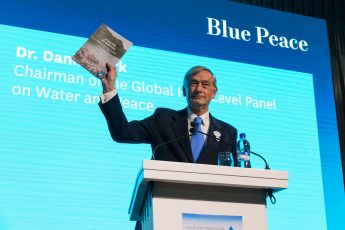The Global High-Level Panel of the Water and Peace has launched World Water and Peace Report in Geneva, Switzerland. The report called for intensifying international efforts for preventing water-related conflicts and leveraging water as an instrument of peace.
“Since water supply is likely to become a major source of tension in the coming years, there is huge potential today to make water a key medium for cooperation and a driver of peace,” the head of the Federal Department of Foreign Affairs, Federal Councillor Didier Burkhalter, told the members of the Global Panel on Water and Peace.
The panel, which was established in November 2015 and was chaired by former Slovenian President Danilo Türk, presented the results of their work in the form of a set of recommendations to prevent and resolve water-related conflicts in Geneva on September 14.
The Global High-Level Panel consists of 15 co-convening countries –Cambodia, Colombia, Costa Rica, Estonia, France, Ghana, Hungary, Jordan, Kazakhstan, Morocco, Oman, Senegal, Slovenia, Spain, and Switzerland, with support from the Strategic Foresight Group and the Geneva Water hub, acting as Secretariat of the Panel.
 The report highlighted the United Nations Millennium Development Goals for 2000 and 2015, seeking international cooperation to prevent and resolve water-related conflicts. In its recommendations, the report called for the relevant international organizations and UN bodies, including the Security Council’s Counterterrorism Committee, studying the trends in the development of technologies for protecting water infrastructure and stimulate international cooperation for their effective use in situations of armed conflicts.
The report highlighted the United Nations Millennium Development Goals for 2000 and 2015, seeking international cooperation to prevent and resolve water-related conflicts. In its recommendations, the report called for the relevant international organizations and UN bodies, including the Security Council’s Counterterrorism Committee, studying the trends in the development of technologies for protecting water infrastructure and stimulate international cooperation for their effective use in situations of armed conflicts.
The report also highlighted the importance of developing a global framework for sanitation and water management, and creation of an intergovernmental committee on water and sanitation under the United Nations. The report recommended to the UN General Assembly to convene a Global Conference on International Water Cooperation with the aim of formulating a strategic framework for global water cooperation and a program of action defining specific priorities for the five-year period following the Global Conference.
It has been observed that countries which jointly manage their shared water resources do not go to war with each other, and hence Switzerland is very active in what it calls ‘blue diplomacy’. This kind of diplomacy encourages discussions between the countries which make up the Nile Basin, and between countries in Central Asia and the Middle East. Syria and Yemen are two countries where water scarcity has exacerbated conflicts. Furthermore, according to a study published by the International Institute for Democracy and Electoral Assistance, by 2050 more than half of the world’s population (52 percent) will be living in regions where water is extremely scarce.
Supported by the Geneva Water Hub, the Global Panel on Water and Peace has been working on the report for two years.
Original source: Times of Oman
Published on 24 September 2017

